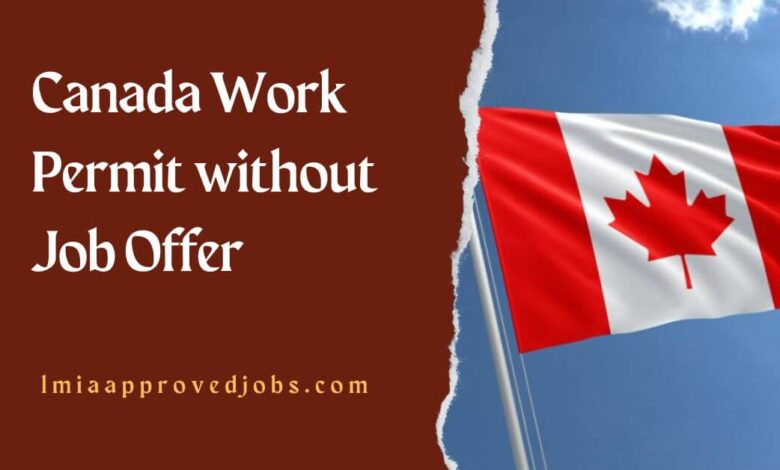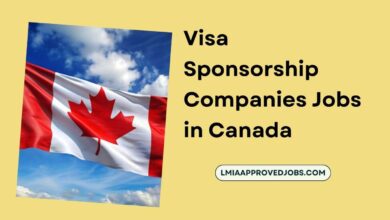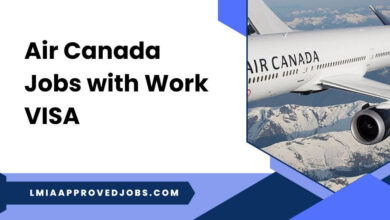Canada Work Permit without Job Offer 2025 – Apply Now

Canada offers a variety of migration programs designed to assist individuals in making permanent settlements. Thanks to its flexible immigration policies, Canada is able to accommodate a wide range of candidates looking to establish themselves in one of the world’s most desirable destinations—without requiring a job offer upfront.
Check Also: Latest Vegetable Farm Worker Jobs in Canada
Each year, thousands of individuals migrate to Canada without a job offer through specific programs designed to support skilled and talented immigrants. Interestingly, Indians have one of the highest success rates when applying for Canadian immigration in comparison to other countries.
Express Entry Program:
The Express Entry system is one of the fastest and most well-known pathways for skilled immigrants to obtain permanent residency in Canada. It operates as a points-based system that processes candidates through three main immigration streams:
- Federal Skilled Worker (FSW)
The FSW program is intended for professionals with significant work experience, language proficiency, and educational qualifications. This program is ideal for individuals who meet the minimum criteria and have foreign work experience. - Federal Skilled Trades Program (FSTP)
The FSTP is aimed at skilled workers in specific trades such as construction, mechanics, and electrical fields. It is designed for individuals with experience in a skilled trade who wish to live and work in Canada. - Canadian Experience Class (CEC)
The CEC program is for individuals who have gained skilled work experience in Canada, whether through post-graduation work permits or other temporary work permits. It allows individuals with Canadian work experience to apply for permanent residency.
To be eligible for the Express Entry system, candidates must meet specific requirements in one of the above categories and submit an online profile. Once profiles are submitted, candidates are ranked according to the Comprehensive Ranking System (CRS) and are invited to apply for permanent residency if they meet the necessary threshold.
Requirements:
Although a job offer is typically required for most work permits in Canada, there are several programs that allow foreign nationals to apply for work permits without one. To qualify for a work permit without a job offer under certain streams, candidates generally must meet the following minimum criteria:
- Work Experience
Applicants must have at least 12 months of continuous work experience in a skilled occupation. The job must fall under the National Occupational Classification (NOC) Skill Level 0, A, or B, which includes managerial, professional, and technical roles. - Language Proficiency
Applicants must demonstrate proficiency in either English or French. This is typically done through a recognized language test like IELTS (International English Language Testing System) or TEF (Test d’Évaluation de Français). For English, candidates must achieve a minimum of Canadian Language Benchmark (CLB) level 7, which corresponds to a 6.0 per band score in IELTS. - Education
The candidate must have completed at least secondary school (high school equivalent). Post-secondary education can increase eligibility for certain programs. - Proof of Funds
Candidates must show they have sufficient financial resources to support themselves and their family members during their stay in Canada. The exact amount depends on the size of the family. - Federal Skilled Worker Program (FSW) Points Grid
To qualify for the Federal Skilled Worker Program, candidates must score a minimum of 67 points on the FSW points grid, which assesses factors such as age, education, work experience, language ability, and adaptability.
Benefits:
Securing a work permit without a job offer can lead to a range of benefits, including:
- Pathway to Permanent Residency
Work permits such as those issued under the International Experience Canada (IEC) program or post-graduation work permits may lead to permanent residency through programs like the Canadian Experience Class (CEC). - Flexibility in Employment Search
Open work permits, which do not require a specific job offer, provide the freedom to work for any employer in Canada. This flexibility allows individuals to explore various job opportunities and industries. - Expand Career Opportunities
Working in Canada enhances your resume by gaining Canadian work experience, which is highly valued by employers. It also helps improve your chances of qualifying for permanent residency. - Access to Social Benefits
As a holder of a valid work permit, you may become eligible for certain social benefits, including healthcare coverage, depending on your province of residence. - Family Inclusion
Certain types of work permits allow your spouse or common-law partner to apply for an open work permit, enabling them to work or study in Canada as well. - Improve Language Skills
Living and working in Canada provides an excellent opportunity to improve your language skills, which can positively impact both your career and permanent residency applications.
How to Apply for Canada Work Permit without Job Offer 2025?
Here are the general steps to apply for a work permit without a job offer:
Step 1: Apply for a Labour Market Impact Assessment (LMIA)
For most work permit categories, your employer must apply for an LMIA to show that hiring a foreign worker will not negatively impact the Canadian job market. However, some programs, like the IEC, do not require an LMIA.
Step 2: Apply for a Work Permit
Once you have a valid LMIA (if required), you can submit your application for a work permit. If you’re applying for an open work permit, no job offer or LMIA is required.
Note: Work permits are typically employer-specific. If you wish to change employers, you may need to apply for a new permit.
Work Permit Duration and Restrictions:
Canada’s work permits are typically issued for a limited time. The duration of the work permit depends on the type of job, the nature of the work, and the terms of the program under which the permit was granted. Most work permits are valid for up to 2 years, but some permits, like the International Mobility Program, allow for longer stays.
Once the permit expires, you may need to leave Canada unless you qualify for permanent residency or another work permit extension.
Note: Temporary foreign workers can generally work in Canada for a maximum of 4 years. After this period, they must leave the country and may be required to stay outside for at least 4 years before they are eligible to apply for another work permit.
Conclusion:
Canada remains one of the most attractive destinations for immigrants. With various pathways like Express Entry, work permits, and post-graduation opportunities, Canada offers many ways for skilled workers to settle and thrive. If you’re interested in working in Canada without a job offer, understanding the requirements and navigating through the proper immigration programs is essential. Be sure to seek professional advice and guidance to ensure you are on the right path to obtaining a work permit or permanent residency.
Frequently Asked Questions:
-
Who is eligible for an open work permit in Canada?
Open work permits are available for international students who have graduated from a Designated Learning Institution (DLI) and are eligible for the Post-Graduation Work Permit Program. Other eligible individuals may include spouses of skilled workers and international students in Canada.
-
What is the new rule for work permits in Canada?
The new rule limits the ability of temporary residents on visitor visas to apply for work permits within Canada. This aims to ensure the integrity of the immigration system and regulate the flow of temporary residents.
-
Can I get a work permit in Canada without a job offer?
Yes, certain programs, such as the IEC or open work permits, do not require a job offer. However, other work permits typically require an employer-specific job offer.



